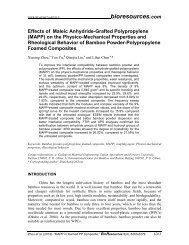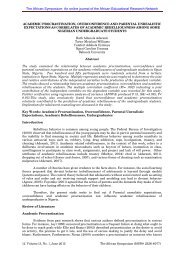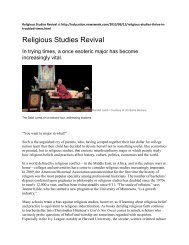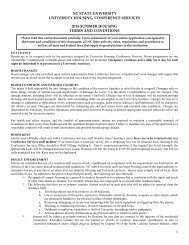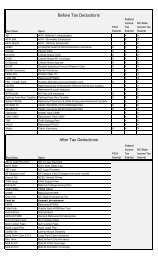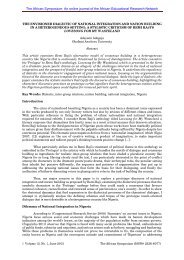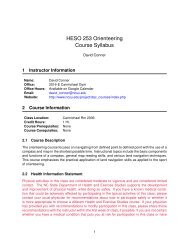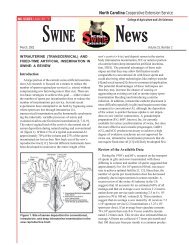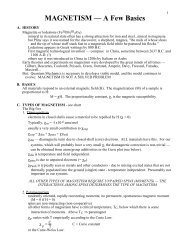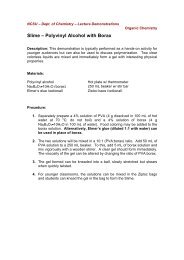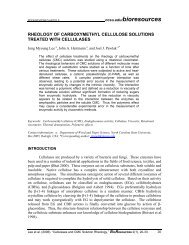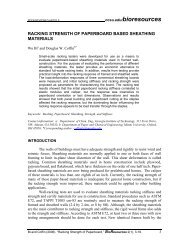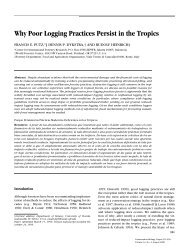Dictators, Songwriters, and the Negotiation of Censorship
Dictators, Songwriters, and the Negotiation of Censorship
Dictators, Songwriters, and the Negotiation of Censorship
You also want an ePaper? Increase the reach of your titles
YUMPU automatically turns print PDFs into web optimized ePapers that Google loves.
Starmakers: <strong>Dictators</strong>, <strong>Songwriters</strong>...<br />
“Tango en segunda” es un tema que hicimos a último momento,<br />
para completar el disco. Lo escribí contra [producer] Jorge Alvarez.<br />
El tipo venía y nos decía que no se podía eso, que estábamos locos si<br />
pensábamos poner aquello, cosas así. Entonces yo me prendía<br />
fuego: “¿Cómo? ¿No vamos a poder decir nada? ¡Estamos<br />
censurándonos!” Por eso le puse eso de “a mí no me gusta tu cara” y<br />
lo de que “hay tres o cuatro mamarrachos con los que yo estoy<br />
mejor.” (“Enciclopedia del rock argentino”)<br />
But according to rock commentator E. Abalos, <strong>the</strong> danger was real, <strong>and</strong> to<br />
have left <strong>the</strong> two songs in question on <strong>the</strong> album would have amounted to<br />
“un virtual suicidio en público” for <strong>the</strong> members <strong>of</strong> <strong>the</strong> b<strong>and</strong>, as well as<br />
producer Jorge Alvarez <strong>and</strong> <strong>the</strong> editor, Mario Kaminsky (56). Although<br />
initially rancorous at <strong>the</strong> mutilation <strong>of</strong> his work, García later acknowledged<br />
producer Alvarez’s contribution, saying, “[a]hora si tengo que agradecerle<br />
algo, se lo agradezco, porque cu<strong>and</strong>o no había nada acá, él se dio cuenta de<br />
muchas cosas.”<br />
The first step away from direct / descriptive language is <strong>the</strong><br />
avoidance <strong>of</strong> realistic anecdotes in favor <strong>of</strong> obviously fictional accounts.<br />
Two songs had to be omitted from <strong>the</strong> final version <strong>of</strong> Anécdotas because<br />
<strong>the</strong>y criticize a senselessly militarized reality: “Botas locas” <strong>and</strong> “Juan<br />
Represión”. In clear, direct language, <strong>the</strong>y characterize <strong>the</strong> army <strong>and</strong><br />
military dictators as pa<strong>the</strong>tic <strong>and</strong> ridiculous figures. One <strong>of</strong> <strong>the</strong> two songs,<br />
“Botas locas”, presents an allegedly autobiographical anecdote about<br />
Charly’s days as a conscripted soldier. “Yo formé parte de un ejército loco /<br />
tenía veinte años y el pelo muy corto”(ll.1-2). The speaker mounts a direct<br />
assault that begins from <strong>the</strong> very first line (“ejército loco”) <strong>and</strong> continues<br />
throughout <strong>the</strong> song as <strong>the</strong> listener is told that “ellos siempre insultan,” “las<br />
estupideces empiezan temprano” <strong>and</strong> “ellos no entendieron nada” (ll. 6-10).<br />
A distinctly antagonistic attitude is revealed in <strong>the</strong> first minute <strong>of</strong> <strong>the</strong> song<br />
when <strong>the</strong> singer resolves “si ellos son la patria, yo soy extranjero” (ll. 14).<br />
The language is direct <strong>and</strong> unobfuscated, <strong>and</strong> would not have been<br />
acceptable to <strong>the</strong> authorities. The pseudo-autobiography had been a<br />
common technique on earlier albums by Charly García, used in numerous<br />
songs. But after “Botas locas”, was removed from Anécdotas, <strong>the</strong> songwriter<br />
61



